新进阶3综合Unit3
《全新版大学进阶英语综合教程3》unit3教案
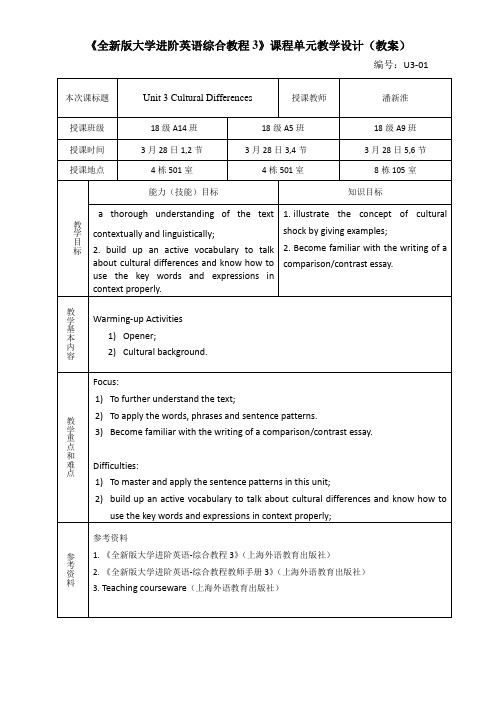
《全新版大学进阶英语综合教程3》课程单元教学设计(教案)编号:U3-01Steps(步骤)教学组织Step One(步骤一)Opener:Pair work: The pictures below compare Westerners (marked in blue) andChinese (marked in pink) in their way of looking at children and the family,travelling, and the role of the boss in an organization. Look at the picturesand work with your partner to answer the questions that follow.Helpful Expressions接送孩子drop off and pick up the child风土人情local customs and culture到此一游been here, done that高高在上superiority有权有势powerfulQuestions:1 In what way does the role of grandparents in Chinese families differ fromthat in Western families2 In what way do Western tourists and Chinese tourists behave differently3 In what way do Western and Chinese employees differ in the way they lookupon their bossTips in this part:1. Introduce the topic to the class by asking if they can give any example ofhow Chinese and non-Chinese behave or think differently in life.2. Explain the pictures in Opener that illustrate the differences between theWesterners and Chinese in their perspective on different issues.3. Ask Ss to look at the pictures and discuss the differences in pairs with theaid of the questions that follow.4. To sum up, have different pairs report to the class their discussion on thepictures, one pair for one picture.Step Two(步骤二)Video watching:After watching a video clip about an interview with three foreign womenmarrying Chinese husbands, discuss the following questions with yourpartner.1. According to the video, when raising grandchildren, what is the difference《全新版大学进阶英语综合教程3》课程单元教学设计(教案)编号:U3-02《全新版大学进阶英语综合教程3》课程单元教学设计(教案)编号:U3-03《新视野大学英语(第三版)》Book 3课程单元教学设计(教案)编号:U3-04DiscussionDiscuss what you like / dislike about where you live.things you like:a food market; a bookstore; close to the metro; a good hospital / medical care centerthings that are nice but not essentiala good local supermarket; a sports center;a theater / cinema; a barthings you dislike:lacking of parking space; various types of noise; pollution; high crime rateThink about your neighborhood. What would make it:saferLectures should be given to tell people how to prevent fire, theft and other dangers. Besides, the police should make sure the streets are safe –not only from crime but also from traffic accidents.more beautifulI think we should plant more trees and flowers in the community. In addition, we should discipline our own behavior and should not litter garbage everywhere or draw on the buildings.more interestingMore entertainment activities should be held to draw the interest of people. Meanwhile, don’t forget the children. We should also provide them with facilities to give them fun and joy.better for your healthI think we should build a community gym providing a variety of affordable exercise options. Besides, activities should be conducted to help people quit smoking or excessive drinking.more of a communityI’d really like to see a good shopping mall, where people can meet, get to know each other and entertain themselves.。
全新版大学进阶英语综合教程第3册unit 3
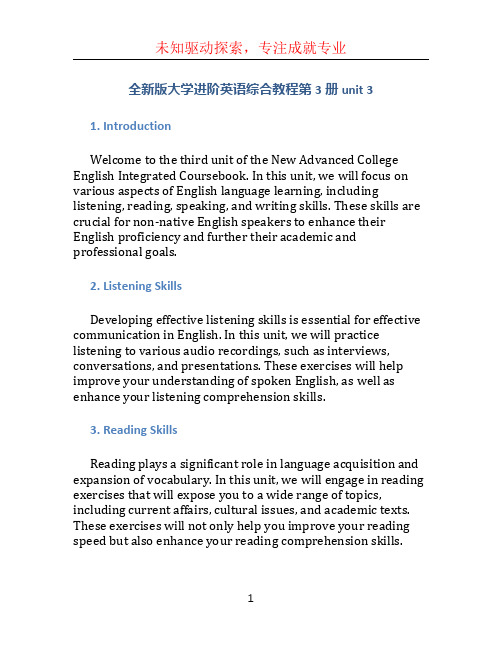
全新版大学进阶英语综合教程第3册unit 31. IntroductionWelcome to the third unit of the New Advanced College English Integrated Coursebook. In this unit, we will focus on various aspects of English language learning, including listening, reading, speaking, and writing skills. These skills are crucial for non-native English speakers to enhance their English proficiency and further their academic and professional goals.2. Listening SkillsDeveloping effective listening skills is essential for effective communication in English. In this unit, we will practice listening to various audio recordings, such as interviews, conversations, and presentations. These exercises will help improve your understanding of spoken English, as well as enhance your listening comprehension skills.3. Reading SkillsReading plays a significant role in language acquisition and expansion of vocabulary. In this unit, we will engage in reading exercises that will expose you to a wide range of topics, including current affairs, cultural issues, and academic texts. These exercises will not only help you improve your reading speed but also enhance your reading comprehension skills.4. Speaking SkillsDeveloping strong speaking skills is crucial for effective communication in English. In this unit, we will practice various speaking activities, such as dialogues, debates, and presentations. These activities will enhance your ability to express yourself fluently and confidently, as well as improve your pronunciation and intonation in spoken English.5. Writing SkillsEffective written communication is vital in various academic and professional settings. In this unit, we will focus on improving your writing skills through various writing exercises, such as essays, reports, and critical analysis. These exercises will help enhance your ability to structure your thoughts logically, communicate ideas clearly, and develop strong arguments in written English.6. Vocabulary ExpansionExpanding your vocabulary is crucial for better communication and comprehension in English. In this unit, we will introduce you to various vocabulary-building exercises, such as word lists, flashcards, and contextual usage. These exercises will help you learn new words and phrases, as well as improve your overall language proficiency.7. Grammar ReviewA solid understanding of grammar is essential for effective English language learning. In this unit, we will review essential grammar topics, such as verb tenses, sentence structure, andparts of speech. These exercises will help reinforce your grammar knowledge and improve your accuracy in using English grammar.8. Practice ExercisesTo further reinforce the concepts learned in this unit, we will provide practice exercises at the end of each section. These exercises will allow you to apply your newly acquired skills and knowledge in a practical context. We encourage you to complete these exercises to solidify your understanding and mastery of the material covered.ConclusionIn conclusion, Unit 3 of the New Advanced College English Integrated Coursebook will provide you with the opportunity to enhance your listening, reading, speaking, and writing skills in English. By engaging in various activities and exercises, you will be able to improve your overall language proficiency and advance your academic and professional goals. We encourage you to actively participate in all the activities and make the most out of this unit.。
unit3(进阶作业)2024-2025学年六年级上册 英语 译林版
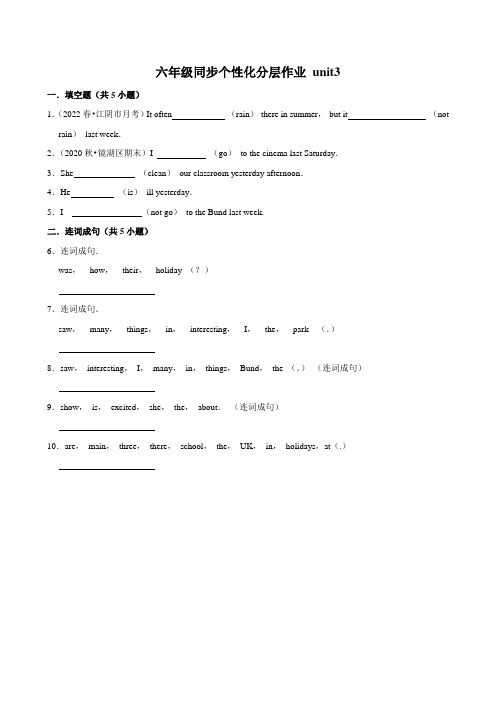
六年级同步个性化分层作业unit3一.填空题(共5小题)1.(2022春•江阴市月考)It often(rain)there in summer,but it(not rain)last week.2.(2020秋•镜湖区期末)I (go)to the cinema last Saturday.3.She(clean)our classroom yesterday afternoon.4.He(is)ill yesterday.5.I (not go)to the Bund last week.二.连词成句(共5小题)6.连词成句.was,how,their,holiday (?)7.连词成句.saw,many,things,in,interesting,I,the,park (.)8.saw,interesting,I,many,in,things,Bund,the (.)(连词成句)9.show,is,excited,she,the,about.(连词成句)10.are,main,three,there,school,the,UK,in,holidays,at(.)六年级同步个性化分层作业unit3参考答案与试题解析一.填空题(共5小题)1.(2022春•江阴市月考)It often rains(rain)there in summer,but it didn't rain(not rain)last week.【分析】夏天经常下雨,但是上周没有下雨.【解答】考查单词填空.第一个空,often表示句子为一般现在时,主语it为第三人称单数形式,谓语动词用第三人称单数rains;第二个空,but表示转折,后面用否定,last week表示上周,用一般过去时,动词的否定在原形rain前加didn't.故答案为:rains,didn't rain.【点评】解答本题时首先要根据语境明确句意,然后再根据相关语法对所给单词在形式上做出正确的变化.2.(2020秋•镜湖区期末)I went(go)to the cinema last Saturday.【分析】上星期六我去看电影了.【解答】本题主要考查单词填空.last Saturday用于一般过去时,谓语动词应该为过去式,go的过去式是went.故答案为:went.【点评】解答本题时首先要根据语境明确句意,然后再根据相关语法对所给单词在形式上做出正确的变化.3.She cleaned(clean)our classroom yesterday afternoon.【分析】昨天下午她打扫了我们的教室.【解答】考查单词填空.根据题干:这里yesterday afternoon用于一般过去时,clean的过去式是cleaned.故答案为:cleaned.【点评】解答本题时首先要根据语境明确句意,然后再根据相关语法对所给单词在形式上做出正确的变化.4.He was(is)ill yesterday.【分析】他昨天病了.【解答】本题主要考查单词填空.yesterday用于一般过去时,动词要用过去式,is的过去式是was.故答案为:was.【点评】解答本题时首先要根据语境明确句意,然后再根据相关语法对所给单词在形式上做出正确的变化.5.I didn't go(not go)to the Bund last week.【分析】上周我没有去外滩。
《全新版大学进阶英语综合教程3》Unit-4教案
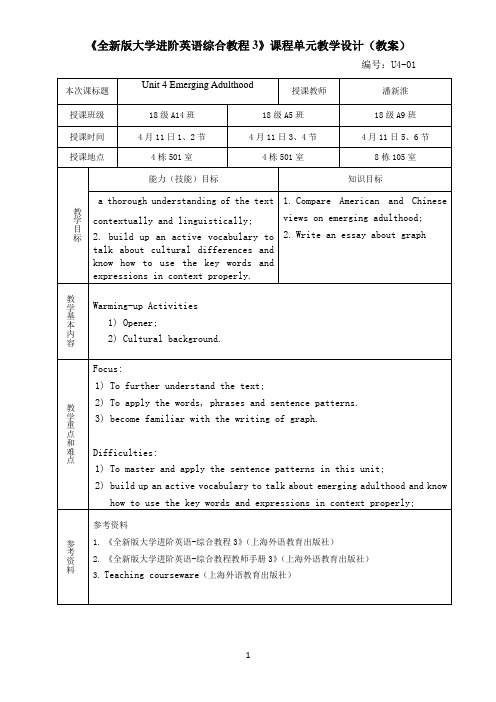
(步骤三)
Cultural Notes:
Talk about Culture Notes“Emerging Adulthood”on Page 92, giving Ss a very basic idea about what is means before going through the context; also, a poem on Page 111 can be talked about to raise Ss’interest.
Expressions:
Almost half of the participants said that...
Only a small number of respondents indicated that....
From the graph it can be seen/concluded that ..
2.《全新版大学进阶英语-综合教程教师手册3》(上海外语教育出版社)
3.Teaching courseware(上海外语教育出版社)
编号:U4-01
Steps
(步骤)
教学组织
Step One
(步骤一)
Opener:
Pair work:Talk about the graph on Page 89 based on the following questions and using the expressions below
pare American and Chinese views on emerging adulthood;
2.Write an essay about graph
教学基本内容
Warming-up Activities
《全新版大学进阶英语综合教程3》Unit3教案(20200701094738)
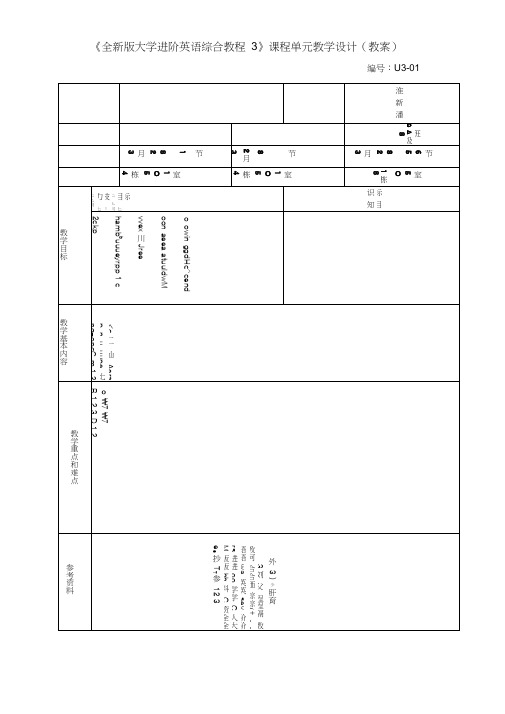
《全新版大学进阶英语综合教程3》课程单元教学设计(教案)编号:U3-01Opener:Pair work: The pictures below compare Westerners (marked in blue) and Chinese (marked in pink) in their way of looking at children and the family, travelling, and the role of the boss in an organization. Look at the pictures an work with your part ner to an swer the questio ns that follow.Helpful Expressi ons接送孩子 drop off and pick up the child 风土人情 local customs and culture 至吐匕一游 been here, done that 高高在上 superiority 有权有势 powerfulQuestio ns:1 In what way does the role of grandparents in Chinese families differ from that in Western families?2 In what way do Western tourists and Chin ese tourists behave differe ntly?3 In what way do Western and Chinese employees differ in the way they look upon their boss?Tips in this part:1. In troduce the topic to the class by ask ing if they can give any example of how Chinese and non-Chinese behave or think differently in life.2. Explai n the pictures in Opener that illustrate the differe nces betwee n the Westerners and Chin ese in their perspective on differe nt issues.3. Ask Ss to look at the pictures and discuss the differences in pairs with the aid of the questi ons that follow.4. To sum up, have differe nt pairs report to the class their discussi on on the pictures, one pair for one picture.Video watchi ng:After watch ing a video clip about an in terview with three foreig n wome n marrying Chinese husbands, discuss the following questions with yourSteps(步骤)教学组织1.whe n what is the differe nee Trave^llfiMg■SiStep One(步骤一)Step Two(步骤二)part ner.《全新版大学进阶英语综合教程3》课程单元教学设计(教案)编号:Comprehe nsion check1. Text Orga ni zati onPair work: This text is organized around the cultural shock the authorexperieneed after the birth of her daughter and her mother-in-law ' fulltime presenee in her family. It can roughly be divided into six parts. Now complete the follow ing table by writ ing dow n the main idea of each part. The first one has been done for you. When you finish, compare notes with your partner.Steps(步骤)教学组织Step One (步骤一)2 Comprehe nsion Check Pair work: With the teacher as guide, you and your partner work on the follow ing comprehe nsion check exercises. 2.1 Diggi ng into detailAn swer the follow ing questi ons to better un dersta nd the text. You may wantto write dow n some key words in the space provided before you do so. (Para. 6) 1 What made the author so mad about her husba nd that they bega n to fight over childcare duties?The fact that he wasn ' t tak ing on half of the childcare duties, and he thought it was more important to spend time on his work than on his daughter, and his expectation that his mother would do all the housework he was supposed to do.(Para. 8) 2 How did her mother-i n-law explai n her role in the family?Her mother-in-law explained that her role in the family was to lighten the burde n of her son, allow ing him to keep his former way of life, and to help her daughter- in-law out with pare nti ng and household man ageme nt.(Para. 9) 3 What did the author think of her mother-in-aw ' s explanation?She thought it was absolutely un acceptable, because, in her view, her husband is one of two parents, and therefore their daughter should be half his responsibility; and she married her husband, not her mother-in-law.(Para. 13) 4 How come her husband, unlike the author, failed to adopt daily habits around the schedule of their daughter?He obviously believed that mothers are the primary caregiver of childre n and this was the no rmal differe nee betwee n mothers and fathers.(Para. 16) 5 How did the author react whe n she was told that, now that her mother-in-law helped her out by taking care of her daughter, it was her resp on sibility to take care of her mother-i n-law whe n she was old?She totally rejected the idea, because she thought what her mother-in-law did was fulfillingthe parenting responsibility of her husband, therefore it was her husband ' s responsibility to take care of his own mother when she was old. 2.2 Un dersta nding difficult senten cesTips in this part :1. Before moving onto the author ' s explou n ttp Ss the text can rough divided into six parts.2. Guide Ss to explore the text by asking them to work on the table in Orga ni zati on and do the task in Digg ing into detail.3. Ask Ss to sum up the differences of views between the author and her mother- in-law on matters described in the text.4. Check Ss' understanding by guiding them through the tasks in Un dersta nding difficult senten ces. Text An alysisThe author ' r eflections on childcare are skilfully framed between the con versati ons with other wives that ope n and close the text. The ope ning sets the scene and introduces her husband and herself. Next comes her mother-in-law, whose strong senseof duty is expressed in a shift to short, emphatic senten ces:“ Her role isclear. She has to be here. ”What follows is part factual account, part persuasive argument. The author does not simply give a neutral description of the differences between her husba nd and herself. She clearly wishes to persuade us that she is right and he is wrong. As a con seque nceher writ ing contains much in com mon with other pieces of persuasive writing. There are therhetorical questions : “lam expected …but he is relieved of his fatherly duties …?” “ Why does he getout of the datasks …?T here is the emotive Ianguage. She is "incensed a f what she sees as hisStep Two(步骤二)“ laz in ess ” ; he “ was n' t honouring ” his role as a father.Towards the end she admits that he has made an effort to compromise, though eve n here she is quick to add “ in resp onse to my growli ngwith the impression of an uneasy truce rather than a meeting of minds.Step Three (步骤三)II. Lan guage FocusWords and expressi ons1. negotiation: n.磋商;谈判e.g. The 6-month negotiations between the two countries ended fruitlessly. 两国谈判半年一无所获。
最新新进阶3 综合Unit 4教案资料
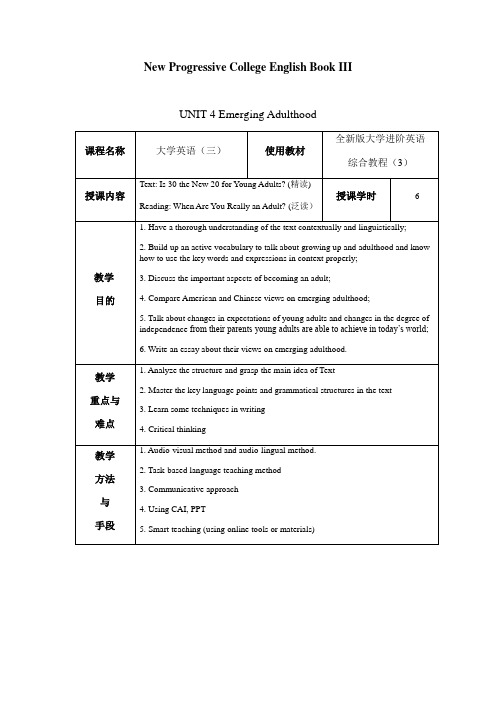
New Progressive College English Book III UNIT 4 Emerging Adulthood1. Teaching Objectives:Students will be able toA. have a thorough understanding of the text contextually and linguistically;B. build up an active vocabulary to talk about growing up and adulthood and know how to usethe key words and expressions in context properly;C. discuss the important aspects of becoming an adult;D. compare American and Chinese views on emerging adulthood;E. talk about changes in expectations of young adults and changes in the degree ofindependence from their parents young adults are able to achieve in today’s world;F. write an essay about their views on emerging adulthood.2. Time Allotment:1st Period: Lead-in Activities (Warm-up activities; Discussion about adulthood)2nd Period: Global Reading (Text: Approaching the theme; Analyzing the text organization)3rd Period: Detailed Reading (Understanding the text in a deeper level; Analyzing difficult sentence structures)4th Period: Detailed Reading Continued (Learning new words; Summarizing good usage)5th Period: Comprehending Reading 1 (Skimming the text; Explaining the difficult sentences of the text; Doing sentence translation))6th Period: After Reading (Viewing and listening; Speaking; Assignment)3. Teaching Procedures:3.1 Lead-in ActivitiesStep 1. Warm-up activitiesThe teacher leads students to figure out the five stages of life (infancy, childhood, adolescence, adulthood and old age) and tells them a new life stage “emerging adulthood”has been proposed by psychologists to describe the period of time between adolescence and adulthood..Method: PPT, communicative approach.Step 2: Discussion about adulthoodThe teacher has students work in pairs and discuss the questions in Opener about their own criteria for reaching adulthood. The teacher reminds students to refer to the helpful words and expressions given below the pictures.Method: Using task-based language teaching method, communicative approach.3.2 Global ReadingStep 1. Approaching the themeThe teacher has students know the background information about the term “emerging adulthood” in Culture Notes.Emerging Adulthood: Starting in 1995, psychologist Jeffrey Jensen Arnett interviewed 300 young people aged 18 to 29 in cities around the nation over five years, asking them questions about what they wanted out of life. Working from those interviews and examining broad demographic indicators, Arnett proposed a new period of life-span development he calls “emerging adulthood”.从1995年开始,历时5年,心理学家杰弗里·阿内特在美国许多城市访谈了300位18-29岁的年轻人,就他们想从生活中得到什么进行提问。
新进阶3-综合Unit-3
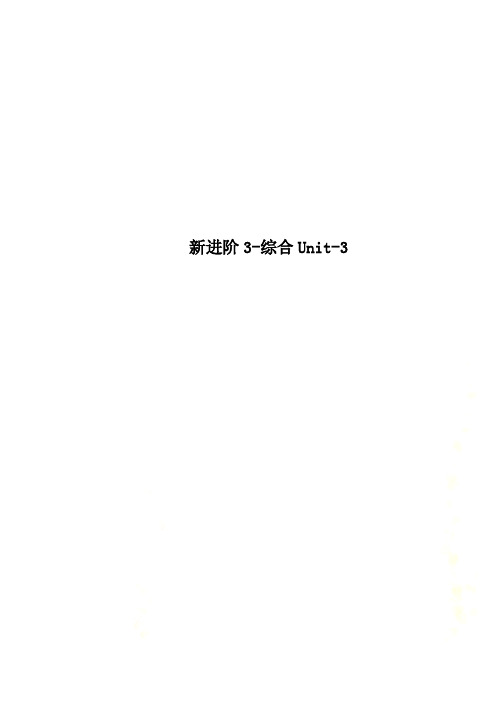
新进阶3-综合Unit-3New Progressive College English Book III UNIT 3 Cultural Differences课程名称大学英语(三)使用教材全新版大学进阶英语综合教程(3)授课内容How My ChineseMother-in-LawReplaced My HusbandReading 1Cultural Differences: Praise(精读)Reading 2 MandarinMadness: The Tones(泛读)授课学时 6教学目的1. Discuss the concept of cultural differences2. Have a thorough understanding of the text contextually and linguistically3. Master the key words and expressions in context properly4. Become familiar with the writing of a comparison/contrast essay教学重点与难点1. Analyze the structure and grasp the main idea of Text2. Master the key language points and grammatical structures in the text3. Learn to write a comparison/contrast essay4. Critical thinking教学方法与手段1. Audio-visual method and audio-lingual method.2. Task-based language teaching method3. Communicative approach4. Using CAI, PPT5. Smart teaching (using online tools or materials)教学过程1. Lead-in ActivitiesStep 1. Warm-up activitiesStep 2. Discussion about cultural differences2. Global ReadingStep 1. Approaching the themeStep 2. Analyzing the text organization3. Detailed ReadingStep 1. Understanding the text in a deeper levelStep 2. Learning useful expressionsStep 3. Learning difficult sentences structuresStep 4. Learning new words4. Comprehending Reading 1Step 1: Skimming the textStep 2: Explaining the difficult sentences of the textStep 3: Doing sentence translation5. After readingStep 1. Viewing and ListeningStep 2. SpeakingStep 3. Assignment作业Assignment:1. Read the text in Reading 2 and finish the exercises.2. Write a comparison/contrast essay3. Preview the next unit.Unit 1 Cultural Differences1. Teaching Objectives:Students will be able toA. have a thorough understanding of the text contextually and linguisticallyB. illustrate the concept of cultural shock by giving examplesC. learn languages, e.g. words, phrases, difficult structureD. become familiar with the writing of a comparison/contrast essay2. Time Allotment:1st Period: Lead-in Activities (Warm-upactivities; Discussion aboutcultural differences)2nd Period: Global-reading (Text:Approaching the theme;analyzing the text organization) 3rd Period: Detailed reading(Understanding the Text A in adeeper level, analyzing difficultsentence structures)4th Period: Detailed reading Activities (Learning new words, summarizing good usage) 5th Period: Comprehending Reading 1(Skimming the text, explainingthe difficult sentences of theText, doing sentencetranslation))6th Period: After-reading Activities (Viewing and Listening; Speaking; Assignment)3. Teaching Procedures:3.1 Lead-in ActivitiesStep 1. Warm-up activitiesThe teacher introduces the topic to the class by asking if they can give any example of how Chinese and non-Chinese behave or think differently in life.Step 2: Discussion about cultural differencesThe teacher explains the pictures in Opener that illustrate the differences between the Westerner and Chinese in their perspectives ondifferent issues. The teacher asks Ss to look at the pictures and discuss the differences in pairs with the aid of the questions that follow. The teacher has different pairs report to the class their discussion on the pictures, one pair for one picture.Method: Using task-based language teaching method, communicative approach.3.2 Global readingStep1. Approaching the themeThe teacher introduces the topic of the text by explaining the cultural shocks the author experienced after the birth of her daughter and her mother-in-law's fulltime presence in her family.Before moving on to the author's account, The teacher explains to Ss the text can roughly be divided into six parts.Method: PPT; communicative approach.Step2. Analyzing the text organizationThe teacher guides Ss to explore the text by asking them to work on the table in TextOrganization and do the task in Digging into detail.Then students should sum up the differences of views between the author and her mother-in- law on matters described in the text.Method: skimming and scanning, communicative approach3.3 Detailed Reading3.3.1 Procedure1) Students are asked to read the passagecarefully again and for each paragraph (sometimes two-three paragraphs), invite students to answer questions related difficult sentences and understanding of each paragraph.2) Help Ss find out the good usage in thetext and underlined them.3) Learn new words in details.Purpose: Further understand the text and train scanning ability to learn difficult sentence structures as well as new words and expressions.Method: Reading the text together; Using task-based language teaching method, reading approach, communicative approach,grammar-translation approach.Step1. Understanding the text in a deeper levelParas.6Q. What made the author so mad about her husband that they began to fight over childcare duties?A: The fact that he wasn’t taking on half of the childcare duties, and he thought it was more important to spend time on his work than on his daughter, and his expectation that his mother would do all the housework he was supposed to do.Para.8Q: How did her mother-in-law explain her role in the family?A: Her mother-in-law explained that her role in the family was to lighten the burden of her son, allowing him to keep his former way of life, and to help her daughter-in-law out with parenting and household management.Para.9Q: What did the author think of her mother-in-law’s explanation?A: She thought it was absolutely unacceptable, because, in her view, her husband is one of two parents, and therefore their daughter should be half his responsibility; and she married her husband, not her mother-in-law.Para.13Q: How come her husband, unlike the author, failed to adopt daily habits around the schedule of her daughter?A: He obviously believed that mothers are the primary caregiver of children and this was the normal difference between mothers and fathers. Paras.16Q: How did the author react when she was told that, now that he mother-in-law helped her out by taking care of he daughter, it was her responsibility to take care of her mother-in-law when she was old?A: She totally rejected the idea, because she thought what her mother-in-law did was fulfilling the parenting responsibility of her husband, therefore it was her husband's responsibility to take care of his own mother when she was old.3.3.2 Language FocusStep2. Learning useful expressions3.3.2.1 Difficult words and phrases1) work out: find the solution to(a problem or question) 想出、得到(解决方法)e.g. It's important to work out a solution rather than engage in endless discussion.2) presence: n.存在;到场e.g. It's natural for a child to be chatting awayin the presence of a loving parent. The tension of the protesters grew with the presence of police.3) extreme: a.(of views or actions)very different from what people accept as reasonable or normal 激的;过激的e.g. Extreme views sometimes can become very popular.Soldiers are trained to carry out orders even if they sound extreme.4) leave behind: depart and not take along 离开;地下e.g. The rough sea crossing served only to emphasize the peace we had left behind.The taxi driver always reminds his passengers not to leave behind their belongings.5) prominent: a. outstanding, important 笑出的;重要的e.g. I want our brand name to appear in the most prominent position of the stadium.We celebrate the Dragon Boat Festival in memory of a prominent ancient Chinese poet.6) primary: a. main 主要的e.g. The young man failed to see that the primary cause of his failure was his laziness and inaction.7) sacrifice: n.牺性;舍弃e.g. It is common for women to make lots of sacrifice for the family.The downside of a self-driving car is the sacrifice of the pleasure of driving.8) bonus: n.意外收获;红利;奖金e.g. I received a box of cookies as a bonus when I bought coffee at a cafe yesterday.Our salesperson's pay is made up of a base salary(about 60% of their total income)and a bonus(about 40% of their total income).9) occasional: a. occurring from time to time 偶尔的e.g. To the occasional swimmer, a season ticket is a waste of money.10) devotion: n.奉献,全身心投入e.g. The scientist who passed away last weekwas fondly remembered for his total devotion to science.11) household:n. the people of a house collectively 家庭e.g. She got up to prepare breakfast while the rest of the household was still asleep.12) look over one's shoulder: keep watch for danger or threats to oneself 不安;小心提防e.g. It was midnight when I left my office and on my way back home I kept looking over my shoulder to see if there was anyone tailing me. 13) repay: vt. do sth. in return for a favor 报答:偿还e.g. There had never been any doubt in her mind that she would look after her parents in their oldage; they had given up a lot for her, she said, and that was how she would repay them. The company has to sell a building to repay its debt.14) kindness: n..仁慈;普行e.g. Very often it would be a kindness to tell a piece of bad news straight away.15) grateful: a. thankful 感激的e.g. The war refugees are very grateful to the local government for the timely help.16) phase: n..阶段;时期e.g. The minister claimed in his speech thatthe manufacturing industry was enteringa very different phase with the rapidgrowth of artificial intelligence.College marks a particular phase in ayoung person's life, the phase of newlygained independence.17) in one's eyes/in the eyes of: in the opinion of, from the perspective of 在.心日中e.g. The educator pointed out that a child could do no wrong in the eyes of some parents.18) fall short of: fail to satisfy 达不到,不符合e.g. I tried my best, yet my performance still fell short of my hopes.19) hono(u)r: vt. do what is required by a promise or a contract 信守;执行e.g. High school students in Shanghai must honour their community service commitmentsandcomplete at least 40 hours of volunteer work.The international company informed us that it will not be able to honour its contract with us.20) apparent: a. clear and obvious 明显的e.g. The professor said the young man hadmany good qualities despite his apparentassertiveness rudeness.21) wash up: wash dishes 饭后洗餐具e.g. Do Chinese husbands help to wash up after dinner?22) aspect: n..方面e.g. Dealing with people is a primary aspect of my work as a manager.23) burden: n.负担;重负e.g. I hate to be a burden on other people.She sat down on the floor and breathedheavily as though she had come up a hillwith a burden beyond her strength.24) maintain: v. keep In a Certain state, position,or activity 维持;保持e.g. A police force is needed to maintain law and order.It is essential to build up and maintain a reasonable level of physical fitness.25) parenting: n.养育,抚养e.g. There are many programs aiming to teach new parents parenting skills.26) relieve...of: help(sb.)by taking (sth. heavy or difficult)from them 解除(某人)的(负担,困难等)e.g. Some people eat a lot to relieve themselves of anxieties.27) in one’s view: in one's personal opinion 在.看来;按.的看法e.g. In my view, the local government should do more for the elderly.28) responsibility: n. 责任;义务e.g. The mine owner denied all responsibility for the death of the trapped miners.A single parent has to struggle to balance work and family responsibilities.29) get...wrong: (informal) not understand correctly what(sb./sth.)means 误会e.g. Don’t get me wrong, please: I’m not quitting despite the setbacks.30) preference: n.喜好;偏好e.g. Customer preferences must be taken into consideration when designing a new product.Employers have a preference for college graduates who think critically and can communicate effectively.31) equivalent: a.equal as in value, force, or meaning 对等的e.g. His silence is equivalent to an admission of guilt.32) strike a balance: find a sensible middle point between two demands, extremes, etc.; compromise 调和;折衷e.g. The speaker set out his viewpoints on howto strike a balance between the freedomof the press and the right to/of privacy.We have to strike a balance betweenoffering people what they liked with thefirst movie and coming up withsomething new.33) put...in(to)perspective: judge(sth.)by considering it in relation to everything else 全面客观地看待(或判断)e.g. Before you begin to think that it might be safer to starve than to eat and run the risk of foodpoisoning, it's important to put the whole matter of food poisoning into perspective.34) barely: ad. .hardly 很少;几乎没有e.g. We had barely enough to eat, let alone to spare.It seemed that everyone was speaking and we could barely hear the speaker.35) in response to: in reaction to sth. that has happened or been said 对做出反应e.g. In response to traditional Chinese medication, the elderly gentleman quickly recovered.Step3. Learning difficult sentences structures3.3.2.2 Difficult sentences1) In my Western eyes, he was falling short of my expectations and wasn’t honoring his role as a father. (Para.6)As a Westerner, I found his conduct disappointing, and felt that he was failing to take on his responsibilities as a father.2) Our fights seemed to get us nowhere, however. (Para. 7)However, we failed to reach any agreement over the issue in spite of the arguments.3) I felt myself teetering backwards. (Para.9)I was totally shocked to hear what I was told, so much so that I felt as if I was thrown off balance.4) While the men were locked in their own conversation, I vented some of this conflict with the wife.(Para.14):While the men were engaged in talking among themselves, I voiced to the wife my complaints about the conflict.5) After getting away with not changing very many for his daughter, when the time comesTo change my mother-in-law’sdiapers...(Para.16)Note that here “very many” refers to very many diapers. In speaking, “very many” in a negative context is common and acceptable.4. Comprehending Reading 1Teacher asks Ss to read aloud the new words and expressions in the margin, and guide them to sum up the different views regarding the value of praise between the author and her husband.Teacher has Ss complete Comprehension Check for Reading 1.Teacher clarifies some difficult points and do the task in Translation.5. After Reading5.1 Viewing and ListeningTeacher introduces Viewing & Listening to the class: Cultural differences are the theme of this unit. Now we are going to hear an American teaching in China talk about the cultural differences he has observed between China andthe West in general. Teacher plays the video clip once for general comprehension. Teacher plays it again for Ss to fill in the blanks. Time permitting; teacher has Ss work in pairs to discuss if they agree with the speaker’s views and why.5.2 SpeakingTeacher explains the role play task by referring to the instructions. Teacher organizes a group discussion about the specific questions the TV presenter is going to ask. Ss may go over the Tips given in the box. Teacher lets Ss prepare the interview in groups of four, one playing the role of TV presenter, the others playing the roles of, respectively, Ember Swift, Yangxifu, and Sasha. The “TV presenter" makes a list of questions to be asked in the interview, and the Practicing “guests”note down the main idea of their answers to the presenter. Teacher invites at least one group to role-play it in class.5. 3 AssignmentTeacher asks Ss to skim the text and answerthe questions in Comprehension Check for Reading 2.Teacher asks students to write an essay comparing and contrasting Chinese New Year celebrations with Christmas celebrations. Teacher encourages Ss to use words and expressions they’ve learnt from this unit and underline them in their essay. Teacher requires Ss to check it with the Evaluation criteria in Writing before turning in their homework.。
新进阶3 综合Unit (5)
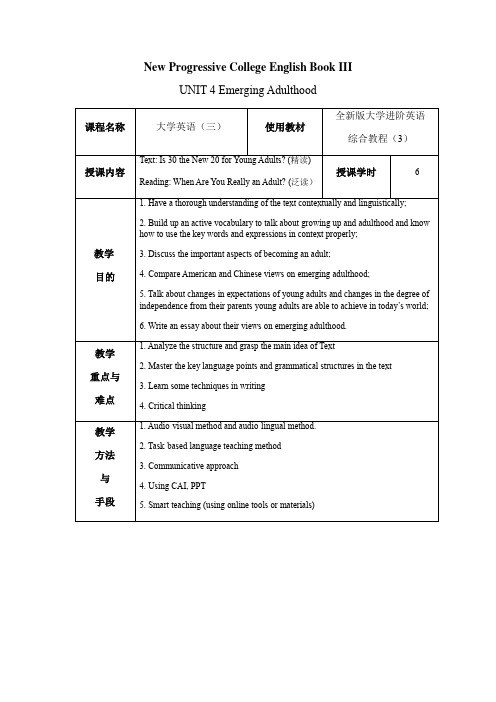
New Progressive College English Book III UNIT 4 Emerging Adulthood1. Teaching Objectives:Students will be able toA. have a thorough understanding of the text contextually and linguistically;B. build up an active vocabulary to talk about growing up and adulthood and know how to usethe key words and expressions in context properly;C. discuss the important aspects of becoming an adult;D. compare American and Chinese views on emerging adulthood;E.talk about changes in expectations of young adults and changes in the degree ofindependence from their parents young adults are able to achieve in today’s world;F. write an essay about their views on emerging adulthood.2. Time Allotment:1st Period: Lead-in Activities (Warm-up activities; Discussion about adulthood)2nd Period: Global Reading (Text: Approaching the theme; Analyzing the text organization)3rd Period:Detailed Reading (Understanding the text in a deeper level; Analyzing difficult sentence structures)4th Period: Detailed Reading Continued (Learning new words; Summarizing good usage)5th Period: Comprehending Reading 1 (Skimming the text; Explaining the difficult sentences of the text; Doing sentence translation))6th Period:After Reading (Viewing and listening; Speaking; Assignment)3. Teaching Procedures:Lead-in ActivitiesStep 1. Warm-up activitiesThe teacher leads students to figure out the five stages of life (infancy, childhood, adolescence, adulthood and old age) and tells them a new life stage “emerging adulthood” has been proposed by psychologists to describe the period of time between adolescence and adulthood..Method: PPT, communicative approach.Step 2: Discussion about adulthoodThe teacher has students work in pairs and discuss the questions in Opener about their own criteria for reaching adulthood. The teacher reminds students to refer to the helpful words and expressions given below the pictures.Method: Using task-based language teaching method, communicative approach.Global ReadingStep 1. Approaching the themeThe teacher has students know the background information about the term “emerging adulthood” in Culture Notes.Emerging Adulthood: Starting in 1995, psychologist Jeffrey Jensen Arnett interviewed 300 young people aged 18 to 29 in cities around the nation over five years, asking them questions about what they wanted out of life. Working from those interviews and examining broad demographic indicators, Arnett proposed a new period of life-span development he calls “emerging adulthood”.从1995年开始,历时5年,心理学家杰弗里·阿内特在美国许多城市访谈了300位18-29岁的年轻人,就他们想从生活中得到什么进行提问。
新进阶3综合unit2答案
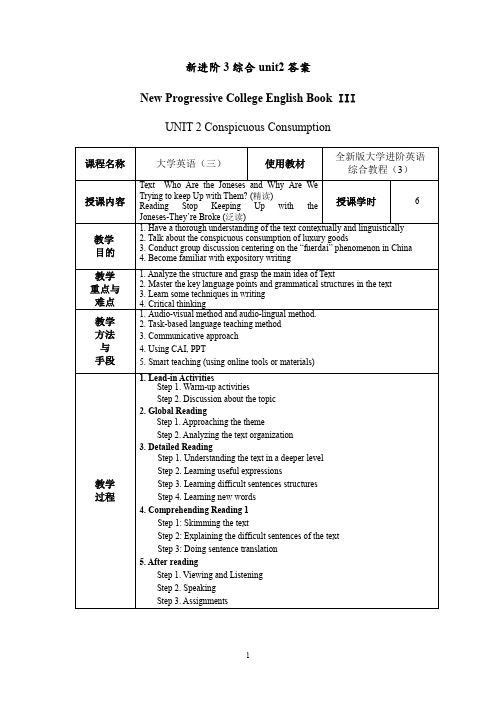
新进阶3综合unit2答案New Progressive College English Book III UNIT 2 Conspicuous Consumption1. Teaching Objectives:Students will be able toA. Have a thorough understanding of the text contextually and linguisticallyB. Talk about the conspicuous consumption of luxury goodsC. Conduct group discussion centering on the “fuerdai” phenomenon in ChinaD. Become familiar with expository writing2. Time Allotment:1st Period: Lead-in Activities (Warm-up activities; Discussion about the topic)2nd Period: Global-reading (Text: Approaching the theme; analyzing the text organization) 3rd Period: Detailed reading (Understanding the Text A in a deeper level, analyzing difficult sentence structures)4th Period: Detailed reading Activities (Learning new words, summarizing good usage) 5th Period: Comprehending Reading 1 (Skimming the text, explaining the difficult sentences of the Text, doing sentence translation))6th Period: After-reading Activities (Viewing and Listening; Speaking; Assignments)3. Teaching Procedures:3.1 Lead-in ActivitiesStep 1. Warm-up activitiesAsk Ss to listen to a song and fill in the missing words in the lyrics.Have Ss work in pairs. One student asks the other the questions in Opener, the other answers. Then switch roles.Method: PPT, communicative approach.Step 2: Discussion about the topicIntroduce the topic of the unit to Ss either in English or Chinese: Sometimes people buy things just for the purpose of showing that they are richer, or have better taste than others. Expensive brand-name goods can serve this purpose, and are often wanted precisely because they are expensive. Whether spending money in this way is good, bad or simply silly is something we are going to explore.Method: Using task-based language teaching method, communicative approach.3.2 Global readingStep 1. Approaching the themeAsk Ss to take a look at the Culture Notes, or ask them to do some further reading before class about the idiom “keep up with the Joneses”, its origins and its social impact, etc.Guide Ss to explore the text to fide the meaning and origin of the expression “keep up with the Joneses”, how this phenomenon came into being, and what we should do to rid ourselves of the pressure of keeping up with the Joneses.Method: PPT; communicative approach.Step.2 Analyzing the text organizationThe teacher tells students that the text can be divided into three parts which have been given in the Text Organization. Then students should summarize the main idea of each part andMethod: skimming and scanning, communicative approach3.3 Detailed Reading3.3.1 Procedure1) Students are asked to read the passage carefully again and for each paragraph (sometimestwo-three paragraphs), invite students to answer questions related difficult sentences and understanding of each paragraph.2) Help Ss find out the good usage in the text and underlined them.3) Learn new words in details.Purpose: Further understand the text and train scanning ability to learn difficult sentence structures as well as new words and expressions.Method:Reading the text together; Using task-based language teaching method, reading approach, communicative approach, grammar-translation approach.Step 1. Questions related difficult sentences and understanding of each paragraph. Paras.2Q. Where does the phrase “Keeping up with the Joneses” come from?A: It comes from a cartoon strip of the same title launched by Pop Momand in 1913.Para.3&4Q: Why were we not aware of what the Joneses were doing prior to the late 1880s?A: Prior to the late 1880s, mass media was not born. We were only concerned about making our own living.Para.4Q: What was the ready solution provided by magazines in order for us to catch up with the Joneses?A: The ready solution was to buy products that were advertised.Para.9Q: Where do true happiness and joy come from, if they are not anything money can buy?A: True happiness and joy come from within.Paras.10Q: What are we supposed to do to stop keeping up with the Joneses?A: Instead of buying into the message that we’re not good enough, we should have positive self-regard. We should realize we don’t have to buy things to impress others.3.3.2 Language Focus3.3.2.1 Difficult sentences:1) I’d love to say that need vanished when the last episode of that comic strip ran, but alas, it seems to have only gotten worse. (Para. 2)I would like to say that need disappeared when the comic strip came to an end, but it seems that things have turned from bad to worse instead.我多么想说,随着最后一集连环漫画的结束,这一心态也不复存在了。
最新新进阶3-综合Unit-1
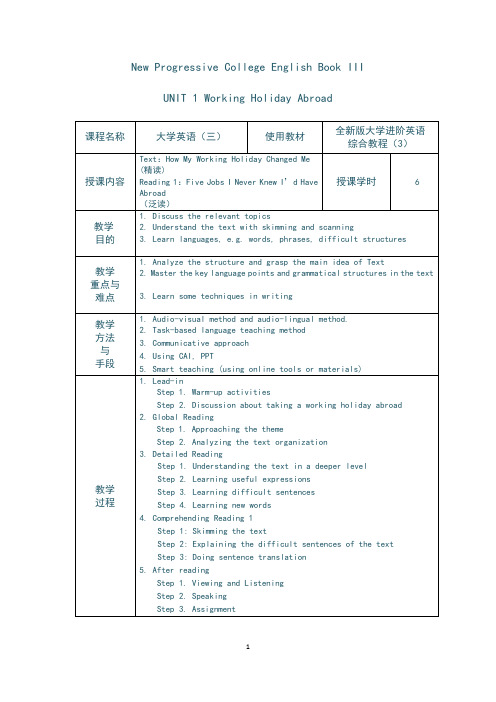
New Progressive College English Book III UNIT 1Working Holiday AbroadWorking Holiday Abroad1. Teaching Objectives:Students will be able toA.discuss the relevant topicsB.understand the text with skimming and scanningC. learn languages, e.g. words, phrases, difficult structuresD. think further2. Time Allotment:1st Period: Lead-in Activities (Warm-up activities; Discussion about working holiday abroad )2nd Period: Global-reading Activities (Text: Approaching the theme; analyzing the text organization)3rd Period: Detailed reading Activities (Understanding the Text in a deeper level, analyzing difficult sentence structures)4th Period: Detailed reading Activities (Learning new words, summarizing good usage)5th Period: Comprehending Reading 1 (Skimming the text, explaining the difficult sentences of the Text, doing sentence translation) 6th Period: After-reading Activities (Viewing and Listening; Speaking;Assignment)3. Teaching Procedures:3.1 Lead-in ActivitiesStep 1. Warm-up activitiesIntroduce the topic to the class: Working Holiday Abroad, and ask students the question:“What a working holiday is ?”Ask the students to watch twice a video clip of a talk about a working holiday in Opener Ask the students to understand the main points by filling blanks of the summary given inOpenerHelp the students to sum up the main points of the talk about a working holiday:A working holiday is when you spend a significant amount of time in anothercountry and have the working rights to back it up. You are able to pick upa job or two (or 6) and breakthat arrangement up by traveling or moving onto a new location in the country.♦With a working holiday visa, you can work as you go♦ A working holiday could end up being a life-changing experience.♦ A working holiday can do wonders for really introducing you to a new culture.Method: Method: PPT; communicative approach.Step 2: Discussion about joys and challenges of taking working holidays overseas Have students work in pair talking about joys and challenges of taking working holidaysoverseas and invites some students to report to the class.Method:Using task-based language teaching method, communicative approach.3.2 Global readingStep 1. Approaching the themeThe teacher asks studentsquestions: How would you like to take a working holiday abroad ? Do you think it would suit you or take too far away from the world in which you feel comfortable ? Do you want to experience joys and challenges of taking working holiday? The students’answers may vary. Then the teacher tells students that they will learn a text about a person’s real experience of taking working holiday abroad, and they will know what it is really like to take working holiday abroad.Method: PPT; communicative approach.Step.2 Analyzing the text organizationThe teacher tells students that the text can be divided into six parts which have been given in the Text Organization. Then students should summarize the main idea of each part and compare notes with each other.Method: skimming and scanning, communicative approach3.3 Detailed Reading3.3.1 Procedure1) Students are asked to read the passage carefully again and for each paragraph(sometimes two-three paragraphs), invite students to answer questions related to difficult sentences and understanding of each paragraph.2) Help Ss find out the good usage in the text and underlined them.3) Learn new words in details.Purpose: Further understand the text and train scanning ability to learn difficult sentence structures as well as new words and expressions.Method: Reading the text together; Using task-based language teaching method, readingapproach, communicative approach, grammar-translation approach.Step 1. Questions related to difficult sentences and understanding of each paragraph.Para.2Q: What happened to the author before she left for Canada ?A: She lost her grandmother, her job and had two car crashes in five months.Para.4Q:What did the author and her co-workers do after work ?A: They met up for dinner, ladies night and sightseeing excursions. The author taught her co-workers an Australian word of the day and they helped her understand the Canadian use of “eh” at the end of sentences.Para.7Q: What did they do while at work ?A: They listened to 90s music, drank their daily Starbucks and served their friendlyregulars.Para.8Q: What does the author mean by saying “ it didn’t feel like my job ?A: She loved her job so much that she didn’t feel she was working.Para.11Q: Where did she travel ?A: She did a massive circle, starting from Vancouver, going all the way to the EastCoast, then acrossSouthern USA and finally up the West Coast.Para.12Q: How did she feel on her trip across Canada and the United States ?A: he was proud of herself for constantly stepping out of her comfort zone andembracing theunknown.Para.14Q: What is her obsession ?A: She is obsessed with browsing craft and design blogs and watching the Lifestyle channel.Para.15Q: In what sense has Vancouver helped the author become a better person?A: Vancouver has helped her to grow personally, have fun professionally and gain confidence.3.3.2 Language Focus3.3.2.1 Difficult sentences:1) Prior to leaving, I was not in a good place. (Para. 2)Before leaving Australia, I had gone through a very difficult period and was low in spirits.出发前,我的境况不好。
《全新版大学进阶英语综合教程3》unit3教案
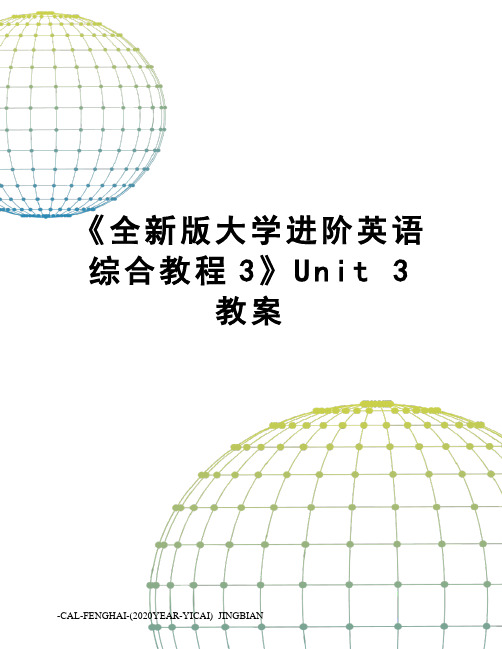
《全新版大学进阶英语综合教程3》U n i t3教案-CAL-FENGHAI-(2020YEAR-YICAI)_JINGBIAN《全新版大学进阶英语综合教程3》课程单元教学设计(教案)编号:U3-01Steps(步骤)教学组织Step One(步骤一)Opener:Pair work: The pictures below compare Westerners (marked in blue) andChinese (marked in pink) in their way of looking at children and the family,travelling, and the role of the boss in an organization. Look at the pictures andwork with your partner to answer the questions that follow.Helpful Expressions接送孩子 drop off and pick up the child风土人情 local customs and culture到此一游 been here, done that高高在上 superiority有权有势 powerfulQuestions:1 In what way does the role of grandparents in Chinese families differ fromthat in Western families?2 In what way do Western tourists and Chinese tourists behave differently?3 In what way do Western and Chinese employees differ in the way they lookupon their boss?Tips in this part:1. Introduce the topic to the class by asking if they can give any example ofhow Chinese and non-Chinese behave or think differently in life.2. Explain the pictures in Opener that illustrate the differences between theWesterners and Chinese in their perspective on different issues.3. Ask Ss to look at the pictures and discuss the differences in pairs with theaid of the questions that follow.4. To sum up, have different pairs report to the class their discussion on thepictures, one pair for one picture.Step Two(步骤二)Video watching:After watching a video clip about an interview with three foreign womenmarrying Chinese husbands, discuss the following questions with yourpartner.《全新版大学进阶英语综合教程3》课程单元教学设计(教案)编号:U3-02《全新版大学进阶英语综合教程3》课程单元教学设计(教案)编号:U3-03《新视野大学英语(第三版)》Book 3课程单元教学设计(教案)编号:U3-04DiscussionDiscuss what you like / dislike about where you live.things you like:a food market; a bookstore; close to the metro; a good hospital / medical care centerthings that are nice but not essentiala good local supermarket; a sports center;a theater / cinema; a barthings you dislike:lacking of parking space; various types of noise; pollution; high crime rateThink about your neighborhood. What would make it:saferLectures should be given to tell people how to prevent fire, theft and other dangers. Besides, the police should make sure the streets are safe –not only from crime but also from traffic accidents.more beautifulI think we should plant more trees and flowers in the community. In addition, we should discipline our own behavior and should not litter garbage everywhere or draw on the buildings.more interestingMore entertainment activities should be held to draw the interest of people. Meanwhile, don’t forget the children. We should also provide them with facilities to give them fun and joy.better for your healthI think we should build a community gym providing a variety of affordable exercise options. Besides, activities should be conducted to help people quit smoking or excessive drinking.more of a communityI’d really like to see a good shopping mall, where people can meet, get to know each other and entertain themselves.。
《全新版大学进阶英语综合教程3》Unit-4教案
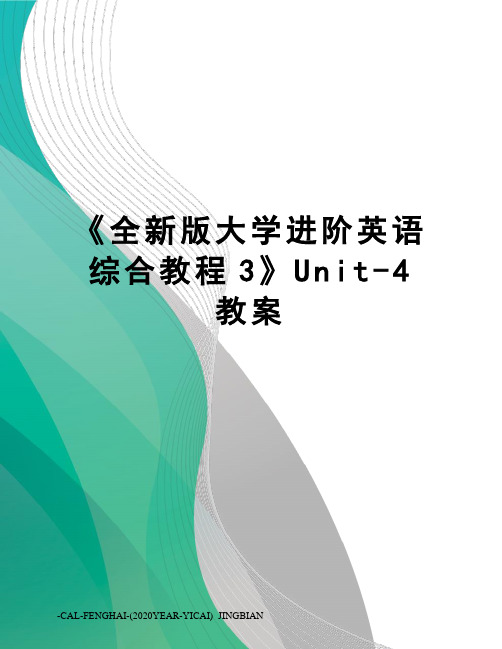
1What is the paragraph about?
2 What is the general conclusion you may draw from the graph?
3 Do you feel that you have reached adulthood Why or why not
4栋501室
8栋105室
ቤተ መጻሕፍቲ ባይዱ教学目标
能力(技能)目标
知识目标
1.have a thorough understanding of the text contextually and linguistically;
2. build up an active vocabulary to talk about cultural differences and know how to use the key words and expressions in context properly.
Expressions:
Almost half of the participants said that...
Only a small number of respondents indicated that....
From the graph it can be seen/concluded that ..
After Ss have done their part, ask them to give a brief report of their discussion.
Step Two
(步骤二)
After Ss finish Step 1, show Ss a model essay on how to write a graph essay and involve Ss in the process of introduction to the steps of writing a graph essay by analyzing the graph and giving more expressions about writing a graph essay.
《全新版大学进阶英语综合教程3》Unit 1教案
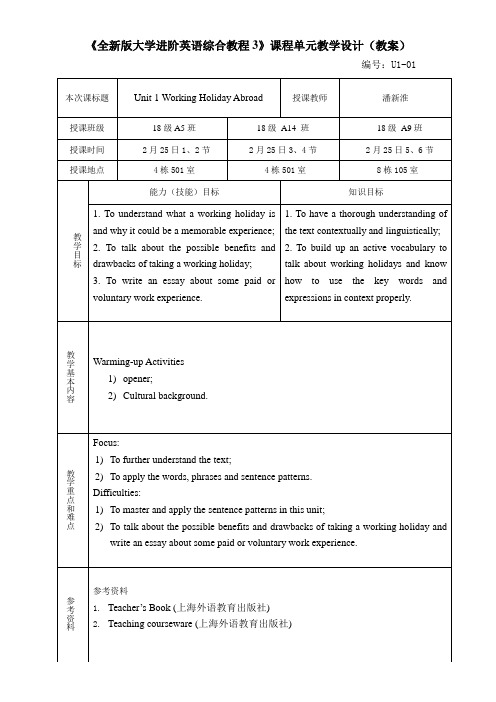
《全新版大学进阶英语综合教程3》课程单元教学设计(教案)编号:U1-01Steps(步骤)教学组织Step One (步骤一)Lead-in:Pair work: You are going to hear a talk about a working holiday. Listen to it twice and complete the following summary according to what you have heard. Compare your answers with your partner. Before you start, getting to know the following new words and expressions might be helpful.Going on a working holiday has many advantages:A working holiday visa grants you access to a country for a longer period of time than a standard tourist visa.The travel is sustainable in the sense that you can keep refilling your travel funds with employment .You can try different types of jobs , even the ones that you normally wouldn’t do when at home . And in this sense, a working holiday could be a life-changing experience.You are more likely to meet and make friends with the locals, not just other tourists . They can introduce you to a new culture .A working holiday makes a good break. A popular time to sign up for a working holiday is the break between high school and college or the break after college and before entering the real working world .Video watching:After watching the video, discuss the following questions with your partner:1. What is the girl’s identity?A. a young employeeB. a waitress《全新版大学进阶英语综合教程3》课程单元教学设计(教案)编号:U1-02《全新版大学进阶英语综合教程3》课程单元教学设计(教案)编号:U1-03《新视野大学英语(第三版)》Book 3课程单元教学设计(教案)编号:U1-04。
《全新版大学进阶英语综合教程3》Unit-5教案
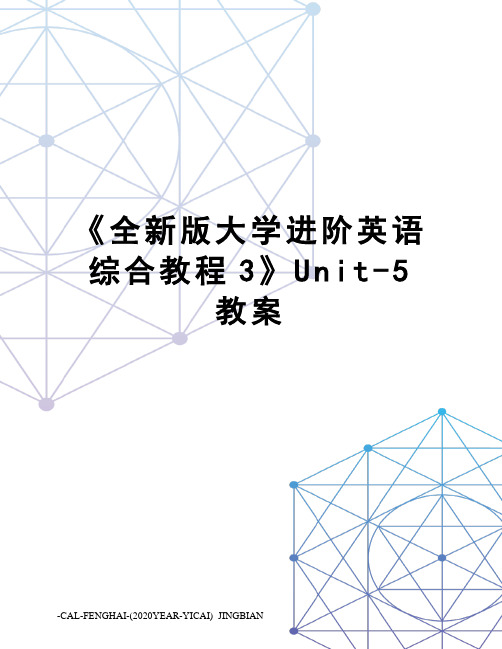
新进阶3 综合Unit 3
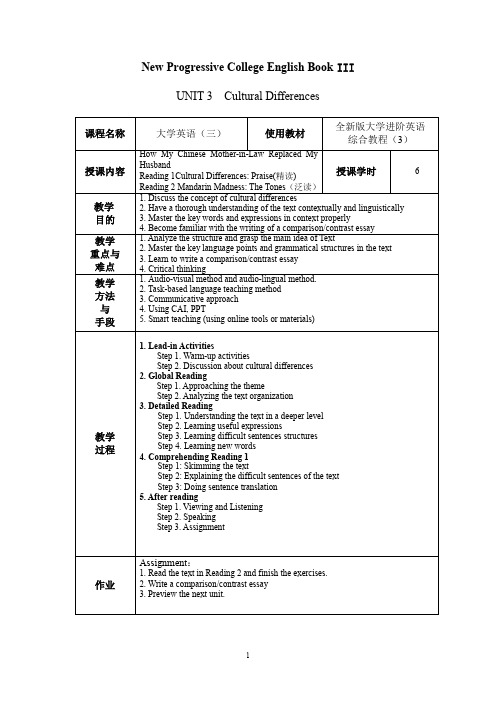
New Progressive College English Book III UNIT 3 Cultural DifferencesUnit 1 Cultural Differences1. Teaching Objectives:Students will be able toA. have a thorough understanding of the text contextually and linguisticallyB. illustrate the concept of cultural shock by giving examplesC. learn languages, e.g. words, phrases, difficult structureD. become familiar with the writing of a comparison/contrast essay2. Time Allotment:1st Period: Lead-in Activities (Warm-up activities; Discussion about cultural differences) 2nd Period: Global-reading (Text: Approaching the theme; analyzing the text organization) 3rd Period: Detailed reading (Understanding the Text A in a deeper level, analyzing difficult sentence structures)4th Period: Detailed reading Activities (Learning new words, summarizing good usage) 5th Period: Comprehending Reading 1 (Skimming the text, explaining the difficult sentences of the Text, doing sentence translation))6th Period: After-reading Activities (Viewing and Listening; Speaking; Assignment)3. Teaching Procedures:3.1 Lead-in ActivitiesStep 1. Warm-up activitiesThe teacher introduces the topic to the class by asking if they can give any example of how Chinese and non-Chinese behave or think differently in life.Step 2: Discussion about cultural differencesThe teacher explains the pictures in Opener that illustrate the differences between the Westerner and Chinese in their perspectives on different issues. The teacher asks Ss to look at the pictures and discuss the differences in pairs with the aid of the questions that follow. The teacher has different pairs report to the class their discussion on the pictures, one pair for one picture.Method: Using task-based language teaching method, communicative approach.3.2 Global readingStep1. Approaching the themeThe teacher introduces the topic of the text by explaining the cultural shocks the author experienced after the birth of her daughter and her mother-in-law's fulltime presence in her family. Before moving on to the author's account, The teacher explains to Ss the text can roughly be divided into six parts.Method: PPT; communicative approach.Step2. Analyzing the text organizationThe teacher guides Ss to explore the text by asking them to work on the table in Text Organization and do the task in Digging into detail.Then students should sum up the differences of views between the author and her mother-in- law on matters described in the text.Method: skimming and scanning, communicative approach3.3 Detailed Reading3.3.1 Procedure1) Students are asked to read the passage carefully again and for each paragraph (sometimestwo-three paragraphs), invite students to answer questions related difficult sentences and understanding of each paragraph.2) Help Ss find out the good usage in the text and underlined them.3) Learn new words in details.Purpose: Further understand the text and train scanning ability to learn difficult sentence structures as well as new words and expressions.Method:Reading the text together; Using task-based language teaching method, reading approach, communicative approach, grammar-translation approach.Step1. Understanding the text in a deeper levelParas.6Q. What made the author so mad about her husband that they began to fight over childcare duties? A: The fact that he wasn’t taking on half of the childcare duties, and he thought it was more important to spend time on his work than on his daughter, and his expectation that his mother would do all the housework he was supposed to do.Para.8Q: How did her mother-in-law explain her role in the family?A: Her mother-in-law explained that her role in the family was to lighten the burden of her son, allowing him to keep his former way of life, and to help her daughter-in-law out with parenting and household management.Para.9Q: What did the author think of her mother-in-law’s explanation?A: She thought it was absolutely unacceptable, because, in her view, her husband is one of two parents, and therefore their daughter should be half his responsibility; and she married her husband, not her mother-in-law.Para.13Q: How come her husband, unlike the author, failed to adopt daily habits around the schedule of her daughter?A: He obviously believed that mothers are the primary caregiver of children and this was the normal difference between mothers and fathers.Paras.16Q: How did the author react when she was told that, now that he mother-in-law helped her out by taking care of he daughter, it was her responsibility to take care of her mother-in-law when she was old?A: She totally rejected the idea, because she thought what her mother-in-law did was fulfilling the parenting responsibility of her husband, therefore it was her husband's responsibility to take care of his own mother when she was old.3.3.2 Language FocusStep2. Learning useful expressions3.3.2.1 Difficult words and phrases1) work out: find the solution to(a problem or question) 想出、得到(解决方法)e.g. It's important to work out a solution rather than engage in endless discussion.2) presence: n.存在;到场e.g. It's natural for a child to be chatting away in the presence of a loving parent. The tension ofthe protesters grew with the presence of police.3) extreme: a.(of views or actions)very different from what people accept as reasonable or normal激的;过激的e.g. Extreme views sometimes can become very popular.Soldiers are trained to carry out orders even if they sound extreme.4) leave behind: depart and not take along 离开;地下e.g. The rough sea crossing served only to emphasize the peace we had left behind.The taxi driver always reminds his passengers not to leave behind their belongings.5) prominent: a. outstanding, important 笑出的;重要的e.g. I want our brand name to appear in the most prominent position of the stadium.We celebrate the Dragon Boat Festival in memory of a prominent ancient Chinese poet.6) primary: a. main 主要的e.g. The young man failed to see that the primary cause of his failure was his laziness and inaction.7) sacrifice: n.牺性;舍弃e.g. It is common for women to make lots of sacrifice for the family.The downside of a self-driving car is the sacrifice of the pleasure of driving.8) bonus: n.意外收获;红利;奖金e.g. I received a box of cookies as a bonus when I bought coffee at a cafe yesterday.Our salesperson's pay is made up of a base salary(about 60% of their total income)and a bonus(about 40% of their total income).9) occasional:a. occurring from time to time 偶尔的e.g. To the occasional swimmer, a season ticket is a waste of money.10) devotion: n.奉献,全身心投入e.g. The scientist who passed away last week was fondly remembered for his total devotion to science.11) household:n. the people of a house collectively 家庭e.g. She got up to prepare breakfast while the rest of the household was still asleep.12) look over one's shoulder: keep watch for danger or threats to oneself 不安;小心提防e.g. It was midnight when I left my office and on my way back home I kept looking over my shoulder to see if there was anyone tailing me.13) repay: vt. do sth. in return for a favor 报答:偿还e.g. There had never been any doubt in her mind that she would look after her parents in their oldage; they had given up a lot for her, she said, and that was how she would repay them. The company has to sell a building to repay its debt.14) kindness: n..仁慈;普行e.g. Very often it would be a kindness to tell a piece of bad news straight away.15) grateful: a. thankful 感激的e.g. The war refugees are very grateful to the local government for the timely help.16) phase: n..阶段;时期e.g. The minister claimed in his speech that the manufacturing industry was entering a verydifferent phase with the rapid growth of artificial intelligence.College marks a particular phase in a young person's life, the phase of newly gained independence.17) in one's eyes/in the eyes of: in the opinion of, from the perspective of 在.心日中e.g. The educator pointed out that a child could do no wrong in the eyes of some parents.18) fall short of: fail to satisfy 达不到,不符合e.g. I tried my best, yet my performance still fell short of my hopes.19) hono(u)r: vt. do what is required by a promise or a contract 信守;执行e.g. High school students in Shanghai must honour their community service commitments andcomplete at least 40 hours of volunteer work.The international company informed us that it will not be able to honour its contract with us.20) apparent: a. clear and obvious 明显的e.g. The professor said the young man had many good qualities despite his apparentassertiveness rudeness.21) wash up: wash dishes 饭后洗餐具e.g. Do Chinese husbands help to wash up after dinner?22) aspect: n..方面e.g. Dealing with people is a primary aspect of my work as a manager.23) burden: n.负担;重负e.g. I hate to be a burden on other people.She sat down on the floor and breathed heavily as though she had come up a hill with a burden beyond her strength.24) maintain:v. keep In a Certain state, position, or activity 维持;保持e.g. A police force is needed to maintain law and order.It is essential to build up and maintain a reasonable level of physical fitness.25) parenting: n.养育,抚养e.g. There are many programs aiming to teach new parents parenting skills.26) relieve...of: help(sb.)by taking (sth. heavy or difficult)from them 解除(某人)的(负担,困难等)e.g. Some people eat a lot to relieve themselves of anxieties.27) in one’s view: in one's personal opinion 在.看来;按.的看法e.g. In my view, the local government should do more for the elderly.28) responsibility:n. 责任;义务e.g. The mine owner denied all responsibility for the death of the trapped miners.A single parent has to struggle to balance work and family responsibilities.29) get...wrong: (informal) not understand correctly what(sb./sth.)means 误会e.g. Don’t get me wrong, please: I’m not quitting despite the setbacks.30) preference: n.喜好;偏好e.g. Customer preferences must be taken into consideration when designing a new product.Employers have a preference for college graduates who think critically and can communicate effectively.31) equivalent: a. equal as in value, force, or meaning 对等的e.g. His silence is equivalent to an admission of guilt.32) strike a balance:find a sensible middle point between two demands, extremes, etc.; compromise 调和;折衷e.g. The speaker set out his viewpoints on how to strike a balance between the freedom of thepress and the right to/of privacy.We have to strike a balance between offering people what they liked with the first movie and coming up with something new.33) put...in(to)perspective: judge(sth.)by considering it in relation to everything else 全面客观地看待(或判断)e.g. Before you begin to think that it might be safer to starve than to eat and run the risk of foodpoisoning, it's important to put the whole matter of food poisoning into perspective.34) barely:ad. .hardly 很少;几乎没有e.g. We had barely enough to eat, let alone to spare.It seemed that everyone was speaking and we could barely hear the speaker.35) in response to: in reaction to sth. that has happened or been said 对做出反应e.g. In response to traditional Chinese medication, the elderly gentleman quickly recovered.Step3. Learning difficult sentences structures3.3.2.2 Difficult sentences1) In my Western eyes, he was falling short of my expectations and wasn’t honoring his role as a father. (Para.6)As a Westerner, I found his conduct disappointing, and felt that he was failing to take on his responsibilities as a father.2) Our fights seemed to get us nowhere, however. (Para. 7)However, we failed to reach any agreement over the issue in spite of the arguments.3) I felt myself teetering backwards. (Para.9)I was totally shocked to hear what I was told, so much so that I felt as if I was thrown off balance.4) While the men were locked in their own conversation, I vented some of this conflict with the wife.(Para.14):While the men were engaged in talking among themselves, I voiced to the wife my complaints about the conflict.5) After getting away with not changing very many for his daughter, when the time comesTo change my mother-in-law’s diapers...(Para.16)Note that here “very many” refers to very many diapers. In speaking, “very many” in a negative context is common and acceptable.4. Comprehending Reading 1Teacher asks Ss to read aloud the new words and expressions in the margin, and guide them to sum up the different views regarding the value of praise between the author and her husband.Teacher has Ss complete Comprehension Check for Reading 1.Teacher clarifies some difficult points and do the task in Translation.5. After Reading5.1 Viewing and ListeningTeacher introduces Viewing & Listening to the class: Cultural differences are the theme of this unit. Now we are going to hear an American teaching in China talk about the cultural differences he has observed between China and the West in general. Teacher plays the video clip once for general comprehension. Teacher plays it again for Ss to fill in the blanks. Time permitting; teacher has Ss work in pairs to discuss if they agree with the speaker’s views and why.5.2SpeakingTeacher explains the role play task by referring to the instructions. Teacher organizes a group discussion about the specific questions the TV presenter is going to ask. Ss may go over the Tips given in the box. Teacher lets Ss prepare the interview in groups of four, one playing the role of TV presenter, the others playing the roles of, respectively, Ember Swift, Yangxifu, and Sasha. The “TV presenter" makes a list of questions to be asked in the interview, and the Practicing “guests”note down the main idea of their answers to the presenter. Teacher invites at least one group to role-play it in class.5. 3 AssignmentTeacher asks Ss to skim the text and answer the questions in Comprehension Check for Reading 2.Teacher asks students to write an essay comparing and contrasting Chinese New Year celebrations with Christmas celebrations. Teacher encourages Ss to use words and expressions they’ve learnt from this unit and underline them in their essay. Teacher requires Ss to check it with the Evaluation criteria in Writing before turning in their homework.。
《全新版大学进阶英语综合教程3》Unit 4教案
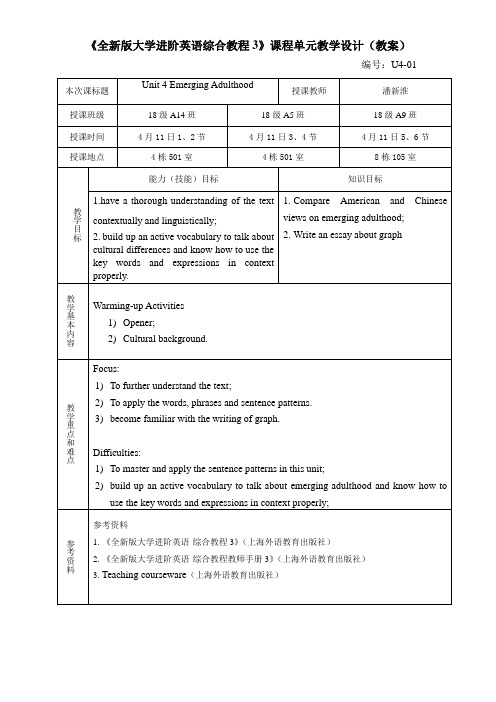
Paragraphs
Main ideas
Part one
Para.1
Today’s twenty-somethings seem like a whole new breed
Part Two
Paras.2-7
Five typical features of emerging adulthood
.
1. Ask Ss to sum up thefeatures of emerging adulthood.
4. Check Ss'to list out the pros and cons of emerging adulthood.
Step Two
(步骤二)
Text Analysis
1)Students are asked to read the passage carefully and for each paragraph, invite students to answer questions related to the details of the text and the difficult sentences
Q:What is the average age of entering marriage now in the U.S.?
A:Today the average age of getting married is 26 for women and 28 for men.
Para. 2
Q:What do young Americans change jobs much more frequently than their parents did?
《全新版大学进阶英语综合教程3》课程单元教学设计(教案)
全新版大学进阶英语第二版综合教程3李荫华课后答案Unit4

Unit 4 Emerging AdulthoodOpenwrSuggested answers for reference:1.The graph shows the results of a survey of emerging adults.2.It may be concluded that almost half of the respondents are not sure whether they have reached adulthood;and accepting responsibility for oneself and becoming financially independent are considered the most important indicators of adulthood as listed in the questionnaire.3.I don't think that I have reached adulthood. This is mainly because I haven't found a suitable job to supportmyself yet. To my mind, being financially independent is a marker of adulthood.4.Accepting responsibility for yourself.I. Understanding the Text1.Text Organization1.2prehension Check2.1Digging into detail1.Today the average age of getting married is 26 for women and 28 for men.2.Because they expect a lot more out of work. They want to find work that is personally fulfilling and isitself an adventure.3.By emerging adulthood, they refer to a new life period which runs typically from age 18 to 25.4.Identity explorations, instability, self-focus, feeling in-between and a sense of possibilities.5.Because they think that young people can make use of the freedom of emerging adulthood to have experiences, otherwise they couldn't have no matter when they were younger or older.6.Some emerging adults feel overwhelmed by the challenges of this life stage,7.Be patient with emerging adults.8.It can help ease our anxiety and may allow us to appreciate their energy, optimism and appetite for life.2.2Understanding difficult sentencesI. B 2. B 3. A 4. A 5. A 6. BII.Focusing on Language in Context1.Key Words & Expressions1.11.New measures have been introduced to ease traffic congestion in the city.2.Although she began as her brother's research assistant, she went on to pursue her own independent studies.3.The optimistic view is that college student enrollment: is climbing and will continue to do so, only at aslower-than-anticipated rate.4.She's just relieved to have snagged a fairly secure job, and doesn't have to look at the want ads all day.5.Parents have a legal obliwtion to ensure that their child receives nine years of compulsory education.6.The company had $2.1 billion in net cash at the end of last year, equal to about 51% of its market value.7.Peter and Jane begin to feel more like roommates rather than a couple. It might be a sign that theirmarriage is heading for trouble.8.Instead of following the career path designed by his parents, he managed to carve out a successfulphotographic career for himself.9.In my view, Jeff must put aside his pride and apologize to his wife and children.10.If we served more soft drinks, there would be fewer hangovers and, above all, fewer drink-drivingaccidents.11.He intends to prepare himself to make his wav in the world by first getting a college degree.11.1hope that we can move things along and get the negotiations going again.13.Most emerging adults are very optimistic, believing that they have good chances of living “better thantheir parents did."14.John drifted alonr aimlessly after graduating from college, saying that he wanted to figure outwhat he wanted to do with his life.15.At some colleges and universities, every student completes an internship to bridge the gap betweenacademics and the working world.1.21. an appetite2. anticipate 3, anxiety 4. text5. the man's identity6. identified7. exceeding8. option1.31.Fueling the boom in the local tourist industry is a new breed of younger, independent travelers from themainland.2.With a positive attitude you see the bright side of life, become optimistic, and expect the best to happen.3.Its just typical of Dan to spend all that money on exercise equipment and then lose interest two monthslater.1.1am so grateful to my parents' qenernus financial support that I can complete college debt-free and liveon my own right after graduation.5.He couldn't figure out why his son quit his well-paid job and started his own business.6.Teachers need to strike a delicate bagnee between instructing their students and letting them discoverthings for themselves.7.She went to New York University to study the violin, then moved on to Yale for a masters degree inperformance.8.Most people now spend their late teens through their mid-twenties in self-focused exploration as they tryout different possibilities in love and work.9.There are employment opportunities with private enterprises, state and local governments as well asnonprofit organizations such as the Red Cross.age1.Leavinv home has always been an important milestone in a person's life and a sign that an individual hasentered adulthood.2.The health club's culture is so alluring that most of its clients want to come back.3.When it comes to the environment problem, developed countries should invest more and do mo re to helpdnvelopinR countries move forward.4.The survey indicated that the top three characteristics of becoming an adult include accepting personalresponsibilities, making decisions indecendentln and financial independence from parents.5.Bob has been out of a job for a while drifting along aimlusslv all day Ion".6.Walking down the street, they saw a big mall decorated with various kinds of neon signs.7.We had a good time there, listening to mu$ic while denkinR tea.8.At that time with a large family to feed, I was so busy trying to m己ke a living that I didn't care aboutwhat was going on abroad.9.Having don。
《全新版大学进阶英语综合教程3》Unit 2教案
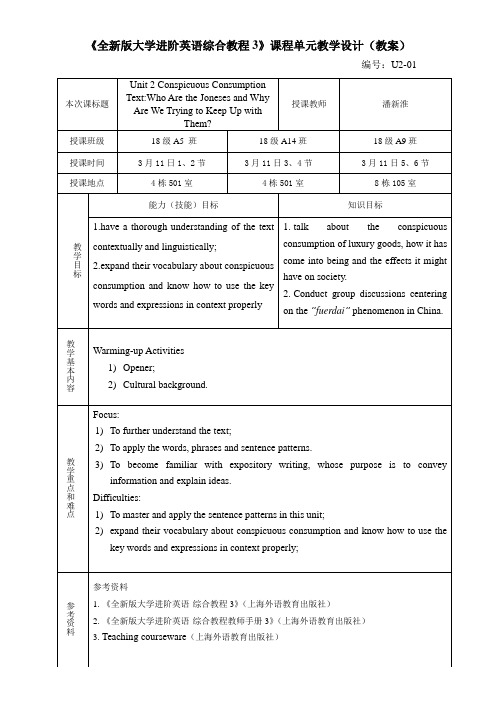
《全新版大学进阶英语综合教程3》课程单元教学设计(教案)编号:U2-01Steps(步骤)教学组织Step One (步骤一)Lead-in:Here is a song that once made Billboard’s Top 5 ‘Hot Country Singles’ (美国Billboard乡村音乐单曲榜TOP 5). Listen to it two or three times, go over the lyrics printed below and fill in the missing words. Then answer the questions that follow. Before you start, reading the culture notes about “keeping up with the Joneses” on page 41 and getting to know the following new words and expressions might be helpful. Keeping up with the JonesesHelpful Expressionsmake the rounds 四处走动fall apart 崩溃;破裂trial n. 审判file /fail/ n. 纵列Notes:1. ’C ause conj. (colloq) = because2. …going out on the town: Here it means they began to goto expensive places they probably couldn’t afford.3. trial: Here it refers to a divorce (离婚) trial in court.4. in single file: one by one, as opposed to hand in hand.“Guess we’ll follow them in single file” implies that we,like the Joneses, will not be a couple anymore.Video watching:Watch the video clip and answer the questions.After watching the video clip, discuss the following questions with your classmates.《全新版大学进阶英语综合教程3》课程单元教学设计(教案)编号:U2-02《全新版大学进阶英语综合教程3》课程单元教学设计(教案)编号:U2-03《新视野大学英语(第三版)》Book 3课程单元教学设计(教案)编号:U2-04。
- 1、下载文档前请自行甄别文档内容的完整性,平台不提供额外的编辑、内容补充、找答案等附加服务。
- 2、"仅部分预览"的文档,不可在线预览部分如存在完整性等问题,可反馈申请退款(可完整预览的文档不适用该条件!)。
- 3、如文档侵犯您的权益,请联系客服反馈,我们会尽快为您处理(人工客服工作时间:9:00-18:30)。
New Progressive College English Book III UNIT 3 Cultural DifferencesUnit 1 Cultural Differences1. Teaching Objectives:Students will be able toA. have a thorough understanding of the text contextually and linguisticallyB. illustrate the concept of cultural shock by giving examplesC. learn languages, e.g. words, phrases, difficult structureD. become familiar with the writing of a comparison/contrast essay2. Time Allotment:1st Period: Lead-in Activities (Warm-up activities; Discussion about cultural differences)2nd Period: Global-reading (Text: Approaching the theme; analyzing the text organization)3rd Period: Detailed reading (Understanding the Text A in a deeper level, analyzing difficult sentence structures)4th Period: Detailed reading Activities (Learning new words, summarizing good usage)5th Period: Comprehending Reading 1 (Skimming the text, explaining the difficult sentences of the Text, doing sentence translation))6th Period: After-reading Activities (Viewing and Listening; Speaking; Assignment)3. Teaching Procedures:3.1 Lead-in ActivitiesStep 1. Warm-up activitiesThe teacher introduces the topic to the class by asking if they can give any example of how Chinese and non-Chinese behave or think differently in life.Step 2: Discussion about cultural differencesThe teacher explains the pictures in Opener that illustrate the differences between the Westerner and Chinese in their perspectives on different issues. The teacher asks Ss to look at the pictures and discuss the differences in pairs with the aid of the questions that follow. The teacher has different pairs report to the class their discussion on the pictures, one pair for one picture.Method: Using task-based language teaching method, communicative approach.3.2 Global readingStep1. Approaching the themeThe teacher introduces the topic of the text by explaining the cultural shocks the author experienced after the birth of her daughter and her mother-in-law's fulltime presence in her family.Before moving on to the author's account, The teacher explains to Ss the text can roughly be divided into six parts.Method: PPT; communicative approach.Step2. Analyzing the text organizationThe teacher guides Ss to explore the text by asking them to work on the table in Text Organization and do the task in Digging into detail.Then students should sum up the differences of views between the author and her mother-in- law on matters described in the text.Method: skimming and scanning, communicative approach3.3 Detailed Reading3.3.1 Procedure1) Students are asked to read the passage carefully again and for each paragraph(sometimes two-three paragraphs), invite students to answer questions related difficult sentences and understanding of each paragraph.2) Help Ss find out the good usage in the text and underlined them.3) Learn new words in details.Purpose: Further understand the text and train scanning ability to learn difficult sentence structures as well as new words and expressions.Method: Reading the text together; Using task-based language teaching method, reading approach, communicative approach, grammar-translation approach.Step1. Understanding the text in a deeper levelParas.6Q. What made the author so mad about her husband that they began to fight over childcare duties?A: The fact that he wasn’t taking on half of the childcare duties, and he thought it was more important to spend time on his work than on his daughter, and his expectation that his mother would do all the housework he was supposed to do. Para.8Q: How did her mother-in-law explain her role in the family?A: Her mother-in-law explained that her role in the family was to lighten the burden of her son, allowing him to keep his former way of life, and to help her daughter-in-law out with parenting and household management.Para.9Q: What did the author think of her mother-in-law’s explanation?A: She thought it was absolutely unacceptable, because, in her view, her husband is one of two parents, and therefore their daughter should be half his responsibility; and she married her husband, not her mother-in-law.Para.13Q: How come her husband, unlike the author, failed to adopt daily habits around theschedule of her daughter?A: He obviously believed that mothers are the primary caregiver of children and this was the normal difference between mothers and fathers.Paras.16Q: How did the author react when she was told that, now that he mother-in-law helped her out by taking care of he daughter, it was her responsibility to take care of her mother-in-law when she was old?A: She totally rejected the idea, because she thought what her mother-in-law did was fulfilling the parenting responsibility of her husband, therefore it was her husband's responsibility to take care of his own mother when she was old.3.3.2 Language FocusStep2. Learning useful expressions3.3.2.1 Difficult words and phrases1) work out: find the solution to(a problem or question) 想出、得到(解决方法)e.g. It's important to work out a solution rather than engage in endless discussion.2) presence: n.存在;到场e.g. It's natural for a child to be chatting away in the presence of a loving parent.The tension of the protesters grew with the presence of police.3) extreme: a.(of views or actions)very different from what people accept as reasonable or normal 激的;过激的e.g. Extreme views sometimes can become very popular.Soldiers are trained to carry out orders even if they sound extreme.4) leave behind: depart and not take along 离开;地下e.g. The rough sea crossing served only to emphasize the peace we had left behind.The taxi driver always reminds his passengers not to leave behind their belongings.5) prominent: a. outstanding, important 笑出的;重要的e.g. I want our brand name to appear in the most prominent position of the stadium.We celebrate the Dragon Boat Festival in memory of a prominent ancient Chinese poet.6) primary: a. main 主要的e.g. The young man failed to see that the primary cause of his failure was his laziness and inaction.7) sacrifice: n.牺性;舍弃e.g. It is common for women to make lots of sacrifice for the family.The downside of a self-driving car is the sacrifice of the pleasure of driving.8) bonus: n.意外收获;红利;奖金e.g. I received a box of cookies as a bonus when I bought coffee at a cafe yesterday.Our salesperson's pay is made up of a base salary(about 60% of their total income)and a bonus(about 40% of their total income).9) occasional:a. occurring from time to time 偶尔的e.g. To the occasional swimmer, a season ticket is a waste of money.10) devotion: n.奉献,全身心投入e.g. The scientist who passed away last week was fondly remembered for his total devotion to science.11) household:n. the people of a house collectively 家庭e.g. She got up to prepare breakfast while the rest of the household was still asleep.12) look over one's shoulder: keep watch for danger or threats to oneself 不安;小心提防e.g. It was midnight when I left my office and on my way back home I kept looking over my shoulder to see if there was anyone tailing me.13) repay: vt. do sth. in return for a favor 报答:偿还e.g. There had never been any doubt in her mind that she would look after her parents in their oldage; they had given up a lot for her, she said, and that was how she would repay them. The company has to sell a building to repay its debt.14) kindness: n..仁慈;普行e.g. Very often it would be a kindness to tell a piece of bad news straight away.15) grateful: a. thankful 感激的e.g. The war refugees are very grateful to the local government for the timely help.16) phase: n..阶段;时期e.g. The minister claimed in his speech that the manufacturing industry wasentering a very different phase with the rapid growth of artificial intelligence.College marks a particular phase in a young person's life, the phase of newly gained independence.17) in one's eyes/in the eyes of: in the opinion of, from the perspective of 在.心日中e.g. The educator pointed out that a child could do no wrong in the eyes of some parents.18) fall short of: fail to satisfy 达不到,不符合e.g. I tried my best, yet my performance still fell short of my hopes.19) hono(u)r: vt. do what is required by a promise or a contract 信守;执行e.g. High school students in Shanghai must honour their community service commitments andcomplete at least 40 hours of volunteer work.The international company informed us that it will not be able to honour its contract with us.20) apparent: a. clear and obvious 明显的e.g. The professor said the young man had many good qualities despite his apparentassertiveness rudeness.21) wash up: wash dishes 饭后洗餐具e.g. Do Chinese husbands help to wash up after dinner?22) aspect: n..方面e.g. Dealing with people is a primary aspect of my work as a manager.23) burden: n.负担;重负e.g. I hate to be a burden on other people.She sat down on the floor and breathed heavily as though she had come up a hill with a burden beyond her strength.24) maintain:v. keep In a Certain state, position, or activity 维持;保持e.g. A police force is needed to maintain law and order.It is essential to build up and maintain a reasonable level of physical fitness.25) parenting: n.养育,抚养e.g. There are many programs aiming to teach new parents parenting skills.26) relieve...of: help(sb.)by taking (sth. heavy or difficult)from them 解除(某人)的(负担,困难等)e.g. Some people eat a lot to relieve themselves of anxieties.27) in one’s view: in one's personal opinion 在.看来;按.的看法e.g. In my view, the local government should do more for the elderly.28) responsibility:n. 责任;义务e.g. The mine owner denied all responsibility for the death of the trapped miners.A single parent has to struggle to balance work and family responsibilities.29) get...wrong: (informal) not understand correctly what(sb./sth.)means 误会e.g. Don’t get me wrong, please: I’m not quitting despite the setbacks.30) preference: n.喜好;偏好e.g. Customer preferences must be taken into consideration when designing a new product.Employers have a preference for college graduates who think critically and can communicate effectively.31) equivalent: a. equal as in value, force, or meaning 对等的e.g. His silence is equivalent to an admission of guilt.32) strike a balance: find a sensible middle point between two demands, extremes, etc.; compromise 调和;折衷e.g. The speaker set out his viewpoints on how to strike a balance between thefreedom of the press and the right to/of privacy.We have to strike a balance between offering people what they liked with the first movie and coming up with something new.33) put...in(to)perspective: judge(sth.)by considering it in relation to everything else 全面客观地看待(或判断)e.g. Before you begin to think that it might be safer to starve than to eat and run the risk of foodpoisoning, it's important to put the whole matter of food poisoning into perspective.34) barely:ad. .hardly 很少;几乎没有e.g. We had barely enough to eat, let alone to spare.It seemed that everyone was speaking and we could barely hear the speaker.35) in response to: in reaction to sth. that has happened or been said 对做出反应e.g. In response to traditional Chinese medication, the elderly gentleman quickly recovered.Step3. Learning difficult sentences structures3.3.2.2 Difficult sentences1) In my Western eyes, he was falling short of my expectations and wasn’t honoring his role as a father. (Para.6)As a Westerner, I found his conduct disappointing, and felt that he was failing to take on his responsibilities as a father.2) Our fights seemed to get us nowhere, however. (Para. 7)However, we failed to reach any agreement over the issue in spite of the arguments.3) I felt myself teetering backwards. (Para.9)I was totally shocked to hear what I was told, so much so that I felt as if I was thrown off balance.4) While the men were locked in their own conversation, I vented some of this conflict with the wife.(Para.14):While the men were engaged in talking among themselves, I voiced to the wife my complaints about the conflict.5) After getting away with not changing very many for his daughter, when the time comesTo change my mother-in-law’s diapers...(Para.16)Note that here “very many” refers to very many diapers. In speaking, “very many” in a negative context is common and acceptable.4. Comprehending Reading 1Teacher asks Ss to read aloud the new words and expressions in the margin, and guide them to sum up the different views regarding the value of praise between the author and her husband.Teacher has Ss complete Comprehension Check for Reading 1.Teacher clarifies some difficult points and do the task in Translation. 5. After Reading5.1 Viewing and ListeningTeacher introduces Viewing & Listening to the class: Cultural differences are the theme of this unit. Now we are going to hear an American teaching in China talk about the cultural differences he has observed between China and the West in general. Teacher plays the video clip once for general comprehension. Teacher plays it again for Ss to fill in the blanks. Time permitting; teacher has Ss work in pairs to discuss if they agree with the speaker’s views and why.5.2SpeakingTeacher explains the role play task by referring to the instructions. Teacher organizes a group discussion about the specific questions the TV presenter is going to ask. Ss may go over the Tips given in the box. Teacher lets Ss prepare the interview in groups of four, one playing the role of TV presenter, the others playing the roles of, respectively, Ember Swift, Yangxifu, and Sasha. The “TV presenter" makes a listof questions to be asked in the interview, and the Practicing “guests” note down the main idea of their answers to the presenter. Teacher invites at least one group to role-play it in class.5. 3 AssignmentTeacher asks Ss to skim the text and answer the questions in Comprehension Check for Reading 2.Teacher asks students to write an essay comparing and contrasting Chinese New Year celebrations with Christmas celebrations. Teacher encourages Ss to use words and expressions they’ve learnt from this unit and underline them in their essay. Teacher requires Ss to check it with the Evaluation criteria in Writing before turning in their homework.。
